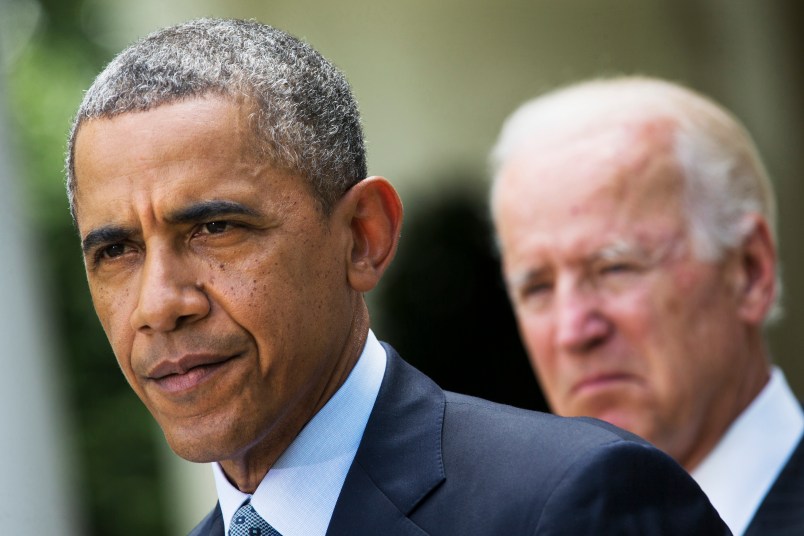When Supreme Court justices suggested in March that certain forms of birth control were abortion-inducing, nobody stood up to point out that the claim by Hobby Lobby lacked support within the medical community.
So it came as little surprise that the 5-4 ruling against the Obamacare contraception mandate ignored the scientific research about whether those contraceptives actually cause abortion. The religious owners of Hobby Lobby and Conestoga Wood believed it, and that was enough.
“If the owners comply with the HHS mandate, they believe they will be facilitating abortions,” Justice Samuel Alito wrote for the Court, decreeing it a “substantial burden” on free exercise of religion and thus in violation of the the Religious Freedom Restoration Act. He devoted large chunks of the opinion to detailing the beliefs of the Greens and Hahns, the Christian families who own the two respective businesses which sued.
As it turns out, the justices weren’t legally required to consider the science. Quite the opposite: RFRA, a statute passed by a Democratic Congress and signed by President Bill Clinton in 1993, grants special treatment under the law to religious people regardless of whether their beliefs are substantiated by evidence.
“I think RFRA was a very unfortunate law because it enshrined a legal shield for [religious] people even if they had irrational beliefs,” said Sara Rosenbaum, a professor of health policy at George Washington University who co-authored an amicus brief in favor of the birth control mandate. “So if the court feels it’s dealing with someone who’s sincere, I don’t think anybody’s going to subject that person’s belief to a scientific test.”
Four types of contraceptives were challenged in the Hobby Lobby case: two “morning after pills” called Ella and Plan B, and two intrauterine devices (IUDs) called Mirena and ParaGard. Scientists agree the two morning after pills and the IUD Mirena preclude, not terminate, pregnancy by preventing ovulation or fertilization of an egg. The IUD ParaGard also prevents pregnancy but scientists haven’t ruled out the possibility that it sometimes does so after the fertilization of an egg by preventing its implantation in a woman’s uterus (which some religious conservatives consider a form of abortion).
The chart below comes via The New Republic:

The Court ultimately decided that due to RFRA, a religious belief doesn’t have to be scientifically sound in order to exempt its believer from the Obamacare requirement. The day after the Hobby Lobby ruling, a majority of justices ordered the lower courts to hear multiple lawsuits against the birth control mandate, including those that challenge other contraceptives which medical researchers overwhelmingly agree are not abortion-inducing.
During oral arguments, Justice Antonin Scalia said the challengers simply wanted to opt out of “three or four birth controls, not all of them, just those that are abortifacient.” Justice Anthony Kennedy also hinted they were abortion-inducing by saying that under the government’s logic a business “could be forced in principle to pay for abortions.” Chief Justice John Roberts said the challengers object to covering drugs they “believe provide abortions.”
Perhaps cognizant that scientific evidence wasn’t legally relevant, the Obama administration didn’t seek to argue the point. Don Verrilli, the president’s lawyer, conceded that it is the “sincere belief” of the challengers that the contraceptives in question induce abortion, “and we don’t question that.” But he disagreed with their claim and noted such a belief is not reflected in state and federal law.
On Wednesday, Democrats introduced legislation to overturn the Hobby Lobby ruling by clarifying that for-profit businesses must provide contraception and other health care services required by law. While that narrows the Supreme Court’s interpretation of RFRA, it doesn’t seek to change the statute itself.
“We do not amend RFRA,” said Sen. Patty Murray (D-WA), a chief sponsor of the bill.
Under RFRA the Supreme Court has opened the door for other entities, including for-profit corporations that are closely held, to sue to opt out of laws they object to for religious reasons — regardless of whether those beliefs are grounded in scientific fact.
“The whole purpose of RFRA is to honor people’s religious beliefs and so science steps out of the doorstep in RFRA,” Rosenbaum said. “The wonderful thing about being religious is you can believe all sorts of irrational things.”











Science? It doesn’t matter what science says, these religious radicals don’t believe in science.
Plan B is not the abortion pill. There is an abortion pill, but Plan B is not it. Plan B prevents conception it doesn’t abort anything.
But like I said, they don’t care. They won’t listen to anything that has anything to do with science. They only care about their messed up interpretation of the bible.
Kapur simply does not get it. The rightist majority in the Supreme Court has abandoned the pretense of legal reasoning. Their goals could not be clearer.
If only someone ‘stood up’, then …, then … . Then: nothing. Their job is to supply a rationale for certain policies. Does Kapur imagine they’re not up to it? That they will, with a few verbal changes, suddenly feel constrained to interpret the law as written and intended?
Reality beckons: answer its call.
We all know the history of Catholicism and science. Given our current SC, it makes plenty of sense.
NAFTA, the repeal of Glass Steagal and now allowing science to be ignored by religious fanatics. Yet more examples of the damage Clinton did to this country and yet another reason I won’t support Hillary.
Their religious beliefs are wrong, too.
Hormonal contraceptives are good. IUD’s are good. Family planning is good. Safe, legal abortion is good. I would dare speculate that the pill alone has improved more total human welfare then every religion, everywhere, combined.
All this beating around the bush treats Hobby Lobby as if their opinions were valid, respectable and worthy of accommodation under law, but they’re just not.